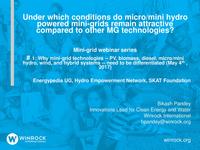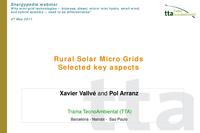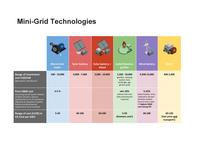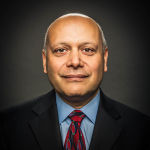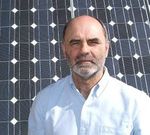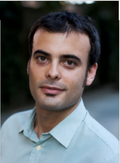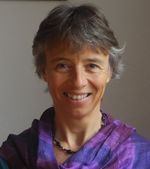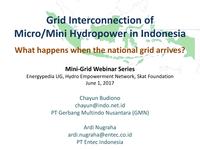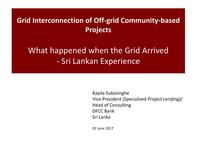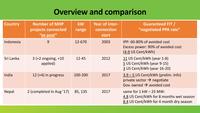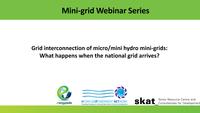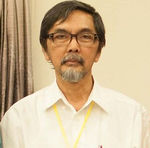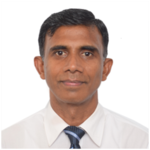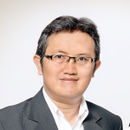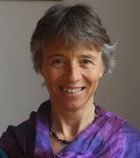Difference between revisions of "Mini-grid Webinar Series"
***** (***** | *****) m |
***** (***** | *****) m |
||
| Line 62: | Line 62: | ||
== Speakers == | == Speakers == | ||
| − | {| | + | {| style="width:100%;" |
|- | |- | ||
| style="width: 176px" | [[File:Picture Bikash Pandey.jpg|left|150px|alt=Picture Bikash Pandey.jpg|link=Mini-grid Webinar Series]] | | style="width: 176px" | [[File:Picture Bikash Pandey.jpg|left|150px|alt=Picture Bikash Pandey.jpg|link=Mini-grid Webinar Series]] | ||
| Line 96: | Line 96: | ||
== Moderator == | == Moderator == | ||
| − | {| | + | {| style="width:100%;" |
|- | |- | ||
| style="width: 176px" | | | style="width: 176px" | | ||
| Line 129: | Line 129: | ||
<br/> | <br/> | ||
| − | == Downloads the Presentations== | + | == Downloads the Presentations == |
| − | {| style="width | + | |
| + | {| style="width:100%;" | ||
|- | |- | ||
| − | | [[File:Grid Interconnection of Micro & mini Hydropower in Indonesia.pdf|thumb|left|200px|Grid Interconnection_ Chayun Budiono and Ardi Nugraha| | + | | [[File:Grid Interconnection of Micro & mini Hydropower in Indonesia.pdf|thumb|left|200px|Grid Interconnection_ Chayun Budiono and Ardi Nugraha|link=https://energypedia.info/images/4/40/Grid_Interconnection_of_Micro_%26_mini_Hydropower_in_Indonesia.pdf]] |
| − | link=https://energypedia.info/images/4/40/Grid_Interconnection_of_Micro_%26_mini_Hydropower_in_Indonesia.pdf]] | ||
| [[File:Grid Interconnection - Sri Lanka.pdf|thumb|200px|Grid Interconnection - | | [[File:Grid Interconnection - Sri Lanka.pdf|thumb|200px|Grid Interconnection - | ||
| − | Kapila Subasinghe|link=https://energypedia.info/images/f/f2/Grid_Interconnection_-_Sri_Lanka.pdf]] | + | Kapila Subasinghe|link=https://energypedia.info/images/f/f2/Grid_Interconnection_-_Sri_Lanka.pdf]] |
| − | | [[File:Comparison Table.pdf|thumb| | + | | [[File:Comparison Table.pdf|thumb|right|200pxpx|Grid Interconnection Comparison Table|link=https://energypedia.info/images/3/3c/Comparison_Table.pdf]] |
| + | | [[File:Relevant Knowledge Products.pdf|thumb|right|200pxpx|alt=Relevant Knowledge Products.pdf|link=https://energypedia.info/images/5/56/Relevant_Knowledge_Products.pdf]] | ||
| + | |} | ||
| − | |||
| − | |||
| − | |||
<br/> | <br/> | ||
</div> | </div> | ||
== Speakers == | == Speakers == | ||
| − | {| | + | {| style="width: 100%;" |
|- | |- | ||
| style="width: 176px;" | | | style="width: 176px;" | | ||
[[File:Chayun Budiono.jpg|border|center|150px|alt=Chayun Budiono.jpg|link=Mini-grid Webinar Series#2nd Webinar: Grid-Interconnection]] | [[File:Chayun Budiono.jpg|border|center|150px|alt=Chayun Budiono.jpg|link=Mini-grid Webinar Series#2nd Webinar: Grid-Interconnection]] | ||
| − | | style="width: 566px" | '''Chayun Budiono''' obtained his master degree in Renewable Energy System with emphasis on Economics of Energy Supply System from the University of Oldenburg (Germany) in 1993. He received his bachelor degree in Physics in 1975 and obtained his engineering degree on Engineering Physics in 1978. He has been active in renewable energy development activities after his under-graduation in 1975 where he started his involvement with solar collectors, solar desalination, domestic solar water heating, and solar dryer. Since then he devoted his activities in renewable energy developments and energy conservation activities, particularly those related closely with rural, off-grid and sustainable development. He has also provided his expertise to a broad range of services in energy planning and auditing, cogeneration in industrial process, and renewable energy development for rural applications (including biomass, solar PV and thermal, and small hydro). Currently he provides lecture on related energy topics at the “Sepuluh Nopember” Institute of Technology (ITS) in Surabaya, Indonesia. He also poses as the Managing Director of PT Gerbang Multindo Nusantara (GMN), a privately owned Indonesian green energy system integrator. | + | | style="width: 566px" | |
| + | '''Chayun Budiono''' obtained his master degree in Renewable Energy System with emphasis on Economics of Energy Supply System from the University of Oldenburg (Germany) in 1993. He received his bachelor degree in Physics in 1975 and obtained his engineering degree on Engineering Physics in 1978. He has been active in renewable energy development activities after his under-graduation in 1975 where he started his involvement with solar collectors, solar desalination, domestic solar water heating, and solar dryer. Since then he devoted his activities in renewable energy developments and energy conservation activities, particularly those related closely with rural, off-grid and sustainable development. He has also provided his expertise to a broad range of services in energy planning and auditing, cogeneration in industrial process, and renewable energy development for rural applications (including biomass, solar PV and thermal, and small hydro). Currently he provides lecture on related energy topics at the “Sepuluh Nopember” Institute of Technology (ITS) in Surabaya, Indonesia. He also poses as the Managing Director of PT Gerbang Multindo Nusantara (GMN), a privately owned Indonesian green energy system integrator. | ||
| + | |||
|- | |- | ||
| style="width: 176px" | | | style="width: 176px" | | ||
| Line 156: | Line 157: | ||
|- | |- | ||
| style="width: 176px" | [[File:Kapila Subasinghe.png|border|center|150px|alt=Kapila Subasinghe.png|link=Mini-grid Webinar Series#2nd Webinar: Grid-Interconnection]] | | style="width: 176px" | [[File:Kapila Subasinghe.png|border|center|150px|alt=Kapila Subasinghe.png|link=Mini-grid Webinar Series#2nd Webinar: Grid-Interconnection]] | ||
| − | | style="width: 566px" | '''Kapila Subasinghe''' is the Vice President (Specialized Project Lending)/Head of Consulting at DFCC Bank and former Project Director of the World Bank and Global Environment Facility funded Renewable Energy for Rural Economic Development (RERED) Project of the Government of Sri Lanka. <span style="font-size: 13.6px;">Mr. Subasinghe has extensive experience in project management and financing. At DFCC Bank he has worked in the Small and Medium Enterprise Department specializing in project appraisal, implementation and follow-up, including off-grid renewable energy projects. In 2002, he joined the Project Management Department which managed credit lines to Sri Lanka from multilateral agencies. He headed the Department from 2007 to 2010 as Vice President (Project Management) managing credit lines offered to the Government of Sri Lanka by The World Bank, Asian Development Bank, European Investment Bank and KfW Germany. Thereafter, he served as Vice President (Corporate Banking) from 2010 to 2015 where the Department accounted for approximately 50% of DFCC Bank’s lending portfolio comprising of Sri Lankan corporate enterprises in diverse business sectors, including renewable energy. Mr. Subasinghe holds a degree in civil engineering from University of Moratuwa, Sri Lanka and is a Fellow Member of the Chartered Institute of Management Accountants, UK.</span> | + | | style="width: 566px" | |
| + | '''Kapila Subasinghe''' is the Vice President (Specialized Project Lending)/Head of Consulting at DFCC Bank and former Project Director of the World Bank and Global Environment Facility funded Renewable Energy for Rural Economic Development (RERED) Project of the Government of Sri Lanka. <span style="font-size: 13.6px;">Mr. Subasinghe has extensive experience in project management and financing. At DFCC Bank he has worked in the Small and Medium Enterprise Department specializing in project appraisal, implementation and follow-up, including off-grid renewable energy projects. In 2002, he joined the Project Management Department which managed credit lines to Sri Lanka from multilateral agencies. He headed the Department from 2007 to 2010 as Vice President (Project Management) managing credit lines offered to the Government of Sri Lanka by The World Bank, Asian Development Bank, European Investment Bank and KfW Germany. Thereafter, he served as Vice President (Corporate Banking) from 2010 to 2015 where the Department accounted for approximately 50% of DFCC Bank’s lending portfolio comprising of Sri Lankan corporate enterprises in diverse business sectors, including renewable energy. Mr. Subasinghe holds a degree in civil engineering from University of Moratuwa, Sri Lanka and is a Fellow Member of the Chartered Institute of Management Accountants, UK.</span> | ||
| + | |||
|- | |- | ||
| style="width: 176px" | | | style="width: 176px" | | ||
| Line 166: | Line 169: | ||
|- | |- | ||
| style="width: 176px" | [[File:Photo Ardi.JPG|left|130px|alt=Photo Ardi.JPG|link=Mini-grid Webinar Series#2nd Webinar: Grid-Interconnection]] | | style="width: 176px" | [[File:Photo Ardi.JPG|left|130px|alt=Photo Ardi.JPG|link=Mini-grid Webinar Series#2nd Webinar: Grid-Interconnection]] | ||
| − | | style="width: 566px" | '''Ardi Nugraha''' is the Program Manager at Pt Entec Indonesia. His involvement in the mini hydro sector started in 1993 when he joined Yayasan Mandiri, a foundation which promotes appropriate technology and its utilisation for rural community development. Since then he has worked in various community and small business development projects. He has also been involved in designing and introducing institutional models for community based ownership, management and operation for two MHP projects funded by the Energising Development (MHPP and TSU) Program in Indonesia and also designed a management toolkit during community and management setup in the villages. In 2007 he worked on the small business development programme for the Berau regency, East Kalimantan. As a senior trainer for management and operation aspects of stand-alone MHP projects, he is experienced in designing and producing various media for community development and extension activities. | + | | style="width: 566px" | |
| + | '''Ardi Nugraha''' is the Program Manager at Pt Entec Indonesia. His involvement in the mini hydro sector started in 1993 when he joined Yayasan Mandiri, a foundation which promotes appropriate technology and its utilisation for rural community development. Since then he has worked in various community and small business development projects. He has also been involved in designing and introducing institutional models for community based ownership, management and operation for two MHP projects funded by the Energising Development (MHPP and TSU) Program in Indonesia and also designed a management toolkit during community and management setup in the villages. In 2007 he worked on the small business development programme for the Berau regency, East Kalimantan. As a senior trainer for management and operation aspects of stand-alone MHP projects, he is experienced in designing and producing various media for community development and extension activities. | ||
| + | |||
He has a degree in socio-communication from the Padjadjaran University, Bandung. | He has a degree in socio-communication from the Padjadjaran University, Bandung. | ||
| Line 175: | Line 180: | ||
== Moderator == | == Moderator == | ||
| − | {| | + | {| style="width: 100%;" |
|- | |- | ||
| style="width: 176px" | | | style="width: 176px" | | ||
| Line 231: | Line 236: | ||
|} | |} | ||
| − | __NOTITLE__ | + | __NOTITLE__ __NOAUTHORLIST__ __NOEDITSECTION__ |
| − | __NOAUTHORLIST__ | ||
| − | __NOEDITSECTION__ | ||
[[Category:Mini-grid]] | [[Category:Mini-grid]] | ||
Revision as of 15:10, 1 June 2017
|
Mini-Grids Webinar Series |
Renewable energy mini-grids are a widely discussed solution for cost-effective and reliable energy access. However, within the mini-grids dialogue micro and mini hydropower (MHP)1 is often overlooked, despite the large number of beneficial projects operating globally, particularly in rural regions of Asia, Africa, and Latin America.
read more
Many MHP systems originated as water mills that were upgraded to generate electricity (e.g. Afghanistan, Pakistan, and northern India). Some have transitioned from isolated mini-grids to grid-interconnected systems (e.g. Indonesia and Sri Lanka). As a proven technology with a long track record, micro/mini hydropower is the focus of this webinar series, which will also analyze similarities and differences among the various mini-grid technologies. Each webinar in the series will focus on a distinct and relevant topic, namely Technology Differentiation, Grid-Interconnection, and Productive End Use.
The objectives of this webinar series are to strengthen the sector by:
- facilitating exchange among field practitioners, regional and international experts
- creating awareness on up-to-date developments, barriers and opportunities.
[1] In this context, micro hydropower refers to <100kW, and mini hydropower refers to 100 - 1000 kW (or 1MW).
1st Webinar: Technology Differentiation
Webinar: Why mini-grid technologies -- PV, biomass, diesel, micro/mini hydro, wind, and hybrid systems -- need to be differentiated.
Webinar Recording
“Mini-grids” have become increasingly popular in recent years because of:
- the enormous cost of grid extension in rural areas as well as
- the limitations of household systems (e.g. solar home systems).
Often mini-grids based on different energy sources are simply lumped together when it comes to project and program design, calls for proposals, and in legal and regulatory frameworks. However, all mini-grids are not the same. This webinar will highlight the important technical and non-technical features, as well as pros and cons of different technologies to create awareness on the need for differentiation of mini-grid systems.
read more
The main objectives of the webinar are to provide:
- an impartial assessment of different RE technologies for electricity generation in mini grids based on facts and figures and experience from different countries
- an overview and framework for comparison (pros, cons, business models, ranges for specific cost per kW, generation cost per kWh, cost drivers, scalability, variability of the resource and related storage requirements etc.)
- key points to be considered when designing rural electrification programs with different RE technologies.
This webinar on mini-grid technologies is the first in a series of three webinars on mini-grids. Stay tuned for our upcoming webinars -- Grid Interconnection (June 2017) and Productive End Use (July 2017).
Download the Presentations
Q&A During the Webinar
Speakers
|
Bikash Pandey is Director of Innovations for the Clean Energy, Environment and Water group at Winrock International. Pandey’s work experience encompasses 20 years in policy review, design and implementation of a range of clean/renewable energy projects in Africa, Latin America and Asia. A technical specialist in micro- and mini-hydropower systems, he has designed and implemented numerous community-based electrification, clean transportation projects, small-scale mini-grids, and home energy systems. He has extensive experience in developing small-scale renewable energy projects as activities under the Clean Development Mechanism. He also brings experience encouraging policy change within governments, bilateral and multilateral donors to support clean energy. He holds a master’s in energy and resources from the University of California at Berkeley, and a bachelor’s in electrical engineering from MIT. | |
|
Xavier Vallvé holds engineering and Master’s degrees from the University of Waterloo in Canada and is co-founder and director of the engineering and consultancy firm Trama TecnoAmbiental (TTA) in Barcelona, Spain. He has more than 25 years of experience in renewable energy rural electrification and distributed generation projects, autonomous as well as grid tied, RE hybrid technology for islands and isolated villages. This involves complementary interdisciplinary activities in economic, social and management aspects as well as engineering in RE generation and storage. He has been project director or lead consultant for private and government clients and also for projects by UNDP, UNOPS, UNIDO, UNEP, AECID, IDB, WB, EC, IRENA and other agencies. He is director and lecturer of the Master degree “Master en Ingeniería y Gestión de las Energías Renovables” at IL3 (University of Barcelona). | |
Additional Resource Person | |
|
Pol Arranz-Piera has over 17 years experience in renewable energy engineering and consultancy projects. Since 2002 he has been working for Trama TecnoAmbiental, where he currently serves as Projects Director, dealing with projects in the field of rural electrification. He also collaborates as an Associate Researcher at the Technical University of Catalonia (UPC). His academic work focuses on the development of distributed energy generation planning methodologies, supply chains and small scale bioenergy and solar systems. Mr Arranz-Piera has worked in off grid minigrids since 2004 in Perú, Ecuador, Nicaragua, Ivory Coast, Costa Rica, Paraguay, Morocco, Guinea Bissau, Burkina Faso, Sierra Leone, Kenya, and is currently supervising the GEDAP pilot minigrid project in Ghana. | |
Moderator
|
Hedi Feibel is a Renewable Energy and Water Expert at the Swiss Resource Centre and Consultancies for Development (Skat). She has worked for 25 years on assignments in Africa, Asia, the Caribbean and Europe with strong focus on mini and small hydropower. As an energy specialist and hydrologist, she is committed to knowledge transfer and participatory approaches to build up local know-how for the improvement of living conditions. She holds a PhD from the Department of Civil Engineering (Hydrology and Water Management) and Department of Political Economy, Darmstadt University of Technology, Germany. She holds a MSc in Geography / Hydrology, from the Institute of Hydrology, University of Freiburg, Germany. |
2nd Webinar: Grid-Interconnection
Webinar: Grid interconnection of micro/mini hydro mini-grids: What happens when the national grid arrives?
An increasing number of mini-grids built for rural communities are facing the “question” of what happens to the mini-grid when the national grid arrives. Whether this is a serious problem or rather a big opportunity for the community depends on a number of parameters. Micro and mini hydropower systems which in general provide inexpensive renewable energy 24-hours a day can benefit from the grid’s ability to absorb electricity even at times of the day (or night) when local loads are low.
This second webinar in the series will present examples from Indonesia and Sri Lanka where micro and mini hydropower (MHP) systems have been successfully connected to the national grid and even benefited the local community. Country experts will describe how micro and mini hydropower developed in their country and what happened when the grid arrived. They will also explain the current conditions for grid interconnection (e.g. feed-in tariff, technical requirements and economic aspects) as well as the consequential opportunities and challenges for MHP owners.
read more
Particularly in south and southeast Asian countries where national grids are extended not always in a “predictable” way, grid interconnection of MHP systems has emerged as an important topic, ruled by the following aspects:
- options for net metering, level of feed-in tariffs (FiT’s) and other policies and regulatory frameworks that support grid interconnection of decentralised renewables.
- clarity about ownership of the MHP system - especially for subsidised systems - and thus clarity about WHO benefits from the additional revenues.
- optional change of tariff systems for consumers on the (former) mini-grid.
- Possibility to still operate the mini-grid in an isolated mode in case of outages in the big grid.
Additional positive aspects can be: continuous stabilization of the national grid through decentralised energy production, increased domestic renewable energy production and lower carbon footprints.
Downloads the Presentations
Speakers
|
Chayun Budiono obtained his master degree in Renewable Energy System with emphasis on Economics of Energy Supply System from the University of Oldenburg (Germany) in 1993. He received his bachelor degree in Physics in 1975 and obtained his engineering degree on Engineering Physics in 1978. He has been active in renewable energy development activities after his under-graduation in 1975 where he started his involvement with solar collectors, solar desalination, domestic solar water heating, and solar dryer. Since then he devoted his activities in renewable energy developments and energy conservation activities, particularly those related closely with rural, off-grid and sustainable development. He has also provided his expertise to a broad range of services in energy planning and auditing, cogeneration in industrial process, and renewable energy development for rural applications (including biomass, solar PV and thermal, and small hydro). Currently he provides lecture on related energy topics at the “Sepuluh Nopember” Institute of Technology (ITS) in Surabaya, Indonesia. He also poses as the Managing Director of PT Gerbang Multindo Nusantara (GMN), a privately owned Indonesian green energy system integrator. | |
|
Kapila Subasinghe is the Vice President (Specialized Project Lending)/Head of Consulting at DFCC Bank and former Project Director of the World Bank and Global Environment Facility funded Renewable Energy for Rural Economic Development (RERED) Project of the Government of Sri Lanka. Mr. Subasinghe has extensive experience in project management and financing. At DFCC Bank he has worked in the Small and Medium Enterprise Department specializing in project appraisal, implementation and follow-up, including off-grid renewable energy projects. In 2002, he joined the Project Management Department which managed credit lines to Sri Lanka from multilateral agencies. He headed the Department from 2007 to 2010 as Vice President (Project Management) managing credit lines offered to the Government of Sri Lanka by The World Bank, Asian Development Bank, European Investment Bank and KfW Germany. Thereafter, he served as Vice President (Corporate Banking) from 2010 to 2015 where the Department accounted for approximately 50% of DFCC Bank’s lending portfolio comprising of Sri Lankan corporate enterprises in diverse business sectors, including renewable energy. Mr. Subasinghe holds a degree in civil engineering from University of Moratuwa, Sri Lanka and is a Fellow Member of the Chartered Institute of Management Accountants, UK. | |
Additional Resource Person | |
|
Ardi Nugraha is the Program Manager at Pt Entec Indonesia. His involvement in the mini hydro sector started in 1993 when he joined Yayasan Mandiri, a foundation which promotes appropriate technology and its utilisation for rural community development. Since then he has worked in various community and small business development projects. He has also been involved in designing and introducing institutional models for community based ownership, management and operation for two MHP projects funded by the Energising Development (MHPP and TSU) Program in Indonesia and also designed a management toolkit during community and management setup in the villages. In 2007 he worked on the small business development programme for the Berau regency, East Kalimantan. As a senior trainer for management and operation aspects of stand-alone MHP projects, he is experienced in designing and producing various media for community development and extension activities. He has a degree in socio-communication from the Padjadjaran University, Bandung. | |
Moderator
|
Hedi Feibel is a Renewable Energy and Water Expert at the Swiss Resource Centre and Consultancies for Development (Skat). She has worked for 25 years on assignments in Africa, Asia, the Caribbean and Europe with strong focus on mini and small hydropower. As an energy specialist and hydrologist, she is committed to knowledge transfer and participatory approaches to build up local know-how for the improvement of living conditions. She holds a PhD from the Department of Civil Engineering (Hydrology and Water Management) and Department of Political Economy, Darmstadt University of Technology, Germany. She holds a MSc in Geography / Hydrology, from the Institute of Hydrology, University of Freiburg, Germany. |
3rd Webinar: Productive End Use
Webinar: Productive End Use -- Three examples of how to make it happen.
Date: Early July
Time: Forthcoming
Registration link: Forthcoming
Once implemented mini-grids need to be financially sustainable. Their operation and maintenance costs are recovered from tariffs, which depend on power consumption. Providing only lighting is a missed opportunity to bring optimal impact to economically marginalized rural communities. Micro/mini hydropower can generate many kWh's -- we need to learn how to make use of them!
Productive End Use (PEU) of energy refers to activities that increase income or productivity in different sectors such as agriculture (e.g. irrigation, grain milling), manufacturing (e.g. carpentry, welding, and sewing), and the service sector (e.g. restaurants using electric lights, sound systems, refrigerators, mobile charging stations).
This third webinar in the series will focus on PEU of mini/micro hydropower systems. It will examine:
- the social and technical pre-conditions, such as load management and technical reliability, and options such as mechanical drive for agricultural processing
- the increase of load factor through PEU and corresponding increase of the economic viability of the system
- three examples of systems promoting productive end use in different countries. It will present pros and cons of electrifying "existing activities” versus “new businesses”.
<headertabs></headertabs>
Organizers
| Energypedia UG is a non-profit organization that runs and maintains the wiki-based platform, www.energypedia.info. Energypedia.info is an online platform for collaborative knowledge exchange on renewable energy, energy efficiency and energy access in the context of development cooperation. | |
|
|
The Hydro Empowerment Network (HPNET) is a knowledge exchange and advocacy platform for micro/mini hydro practitioners in south and southeast Asia, focusing on policy, technology, and socio-environment solutions for long-term sustainability. Core support for HPNET comes from the WISIONS initiative at the Wuppertal Institute for Climate, Environment and Energy. |
|
|
Skat Foundation was established by Skat Consulting in 2002 to foster the exchange of knowledge and experience in development cooperation through generating, sharing and transferring knowledge about what works and how in selected thematic areas. Skat Foundation has also funded this webinar series. |

